Related Research Articles
Jane Holmes Dixon was an American bishop of the Episcopal Church. She was a suffragan bishop in the Episcopal Diocese of Washington and served as Bishop of Washington pro tempore from 2001 to June 2002. She was the second woman consecrated as a bishop in the Episcopal Church. She died unexpectedly in her sleep in her home in the Cathedral Heights section of Washington, DC on Christmas Day morning in 2012.

Church Divinity School of the Pacific (CDSP) is an Episcopal seminary in Berkeley, California. It is one of the nine seminaries in the Episcopal Church and a member of the Graduate Theological Union. The only Episcopal seminary located in the Far West, CDSP has, since 1911, been designated the official seminary of the Episcopal Church's Eighth Province, the Province west of the Rocky Mountains.

Frank Tracy Griswold III was an American clergyman who served as the 25th Presiding Bishop of the Episcopal Church.
Henry Nutt Parsley, Jr. is an American prelate of the Episcopal Church and the retired tenth Bishop of Alabama, and the former Provisional Bishop of the Diocese of Easton. Parsley is also a former Chancellor of the University of the South in Sewanee, Tennessee. He now resides in Wilmington, North Carolina and attends St. James Parish in Wilmington.

Berkeley Divinity School at Yale, founded in 1854, is a seminary of The Episcopal Church in New Haven, Connecticut. Along with Andover Newton Theological School and the Yale Institute of Sacred Music, Berkeley is one of the three "Partners on the Quad," which are part of Yale Divinity School at Yale University. Thus, Berkeley operates as a denominational seminary within an ecumenical divinity school. Berkeley has historically represented a Broad church orientation among Anglican seminaries in the country, and was the fourth independent seminary to be founded, after General Theological Seminary (1817), Virginia Theological Seminary (1823), and Nashotah House (1842). Berkeley's institutional antecedents began at Trinity College, Hartford in 1849. The institution was formally chartered in Middletown, Connecticut in 1854, moved to New Haven in 1928, and amalgamated with Yale in 1971.

The Episcopal Diocese of Oklahoma dates back to 1837 as a Missionary District of the Episcopal Church in the United States of America. The General Convention of the Episcopal Church recognized the Diocese of Oklahoma in 1937. The diocese consists of all Episcopal congregations in the state of Oklahoma. The ninth Bishop and sixth diocesan Bishop is Poulson C. Reed, consecrated in 2020.

Scott Field Bailey was the 6th diocesan bishop of the Episcopal Diocese of West Texas in the Episcopal Church.
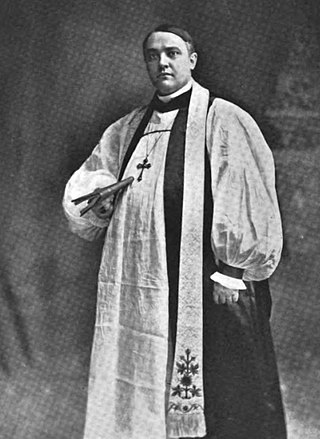
Harry Sherman Longley was a 20th-century bishop in the Protestant Episcopal Church in the United States of America. He served the Diocese of Iowa as suffragan bishop from 1912 to 1917, coadjutor bishop from 1917 to 1929, and diocesan bishop from 1929 to 1943. Longley was the first suffragan and coadjutor bishop in Iowa, and the first bishop to resign the office. He is the only bishop of the diocese to serve in three positions.
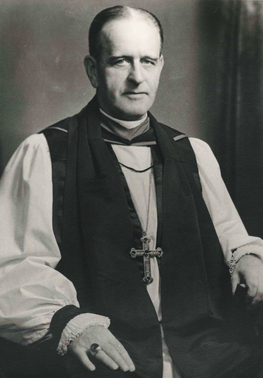
John Henry Esquirol was the ninth bishop of the Episcopal Diocese of Connecticut.
James Elliot Curry served as a suffragan bishop of the Episcopal Diocese of Connecticut from 2000 till 2014.
Edward Harding "Ed" MacBurney SSC was an American Anglican bishop. He was born in Albany, New York to Alfred Cadwell MacBurney (1896-1986) and Florence Marion McDowell MacBurney (1897-1989). A graduate of Dartmouth College, Berkeley Divinity School, and St Stephen's House, Oxford, he was ordained to the priesthood in December 1952 by the Church of England Bishop of Ely Edward Wynn. He served in the Episcopal Diocese of New Hampshire at Trinity Episcopal Church, Hanover, from 1953 to 1973 before appointment as dean of Trinity Episcopal Cathedral in Davenport, Iowa from 1973 to 1987. MacBurney served from 1988 to 1994 as the seventh bishop of the Episcopal Diocese of Quincy. During the consents process following MacBurney's election, Bishop John Shelby Spong of the Episcopal Diocese of Newark "urged his fellow liberal bishops to encourage their diocesan standing committees to confirm Dean MacBurney's election for the sake of the catholicity of the Church."
John McGill Krumm was an American bishop and author. He was the sixth bishop of the Episcopal Diocese of Southern Ohio.

James Winchester Montgomery was an American bishop of the Episcopal Church in Chicago from 1971 to 1987.
Robert Bracewell Appleyard was bishop of the Episcopal Diocese of Pittsburgh from 1968 to 1983.
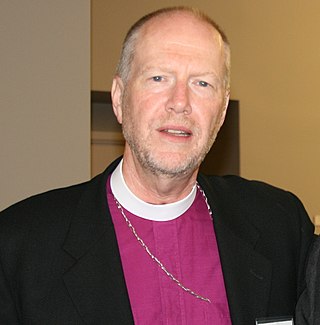
Kirk Stevan Smith was the bishop of the Episcopal Diocese of Arizona from 2004 to 2019.

Joseph Warren Hutchens was diocesan bishop of the Episcopal Diocese of Connecticut from 1971 to 1977. He had served previously as suffragan from 1961.
George Richard Millard was a suffragan bishop of the Episcopal Diocese of California from 1960 to 1978.
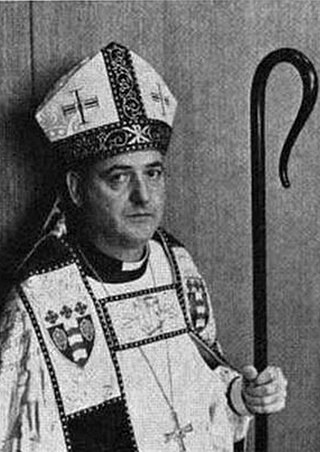
Chauncey Kilmer (Kim) Myers was bishop of the Diocese of California in the Episcopal Church from 1967 to 1979.
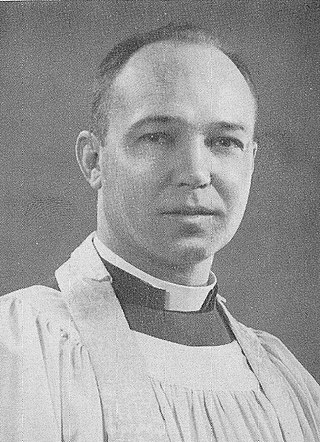
William Evan Sanders was an American Episcopalian bishop. He was the eighth bishop of the Episcopal Diocese of Tennessee from 1977 to 1985, and first bishop of the Episcopal Diocese of East Tennessee from 1985 to 1992. He was consecrated to the episcopate on April 4, 1962.
Frank Clayton Matthews is an American prelate who served as Suffragan Bishop of Virginia between 1993 and 1998 and later as Director of the Office of Pastoral Development.
References
- 1 2 3 4 5 6 7 8 9 "Connecticut Elects Rowthorn Suffragan". The Episcopal News Service. 21 May 1987. Retrieved 27 August 2015.
- 1 2 3 "Rowthorn, Jeffery". Hope Publishing. Retrieved 27 August 2015.
- 1 2 3 4 5 6 7 "Jeffery William Rowthorn" . Crockford's Clerical Directory (online ed.). Church House Publishing . Retrieved 23 June 2018.
- 1 2 "Jeffery William Rowthorn". Clergy Quick Find. Church Publishing Inc. Archived from the original on 5 March 2016. Retrieved 27 August 2015.
- ↑ , Caceres Consecrated Bishop of Ecuador, Diocesan Press Service. March 26, 1971
- ↑ Goldman, Ari L. (5 June 1993). "Election of a Bishop Divides Episcopalians". The New York Times. Retrieved 27 August 2015.
- ↑ Renner, Gerald (6 June 1993). "New Bishop To Head Episcopal Diocese". The Hartford Courant. Retrieved 27 August 2015.
- ↑ Toensmann, Nell (Spring 1999). "Bishop in Europe to Retire". The Grapevine. 6 (2). Province II of the Episcopal Church. Retrieved 27 August 2015.